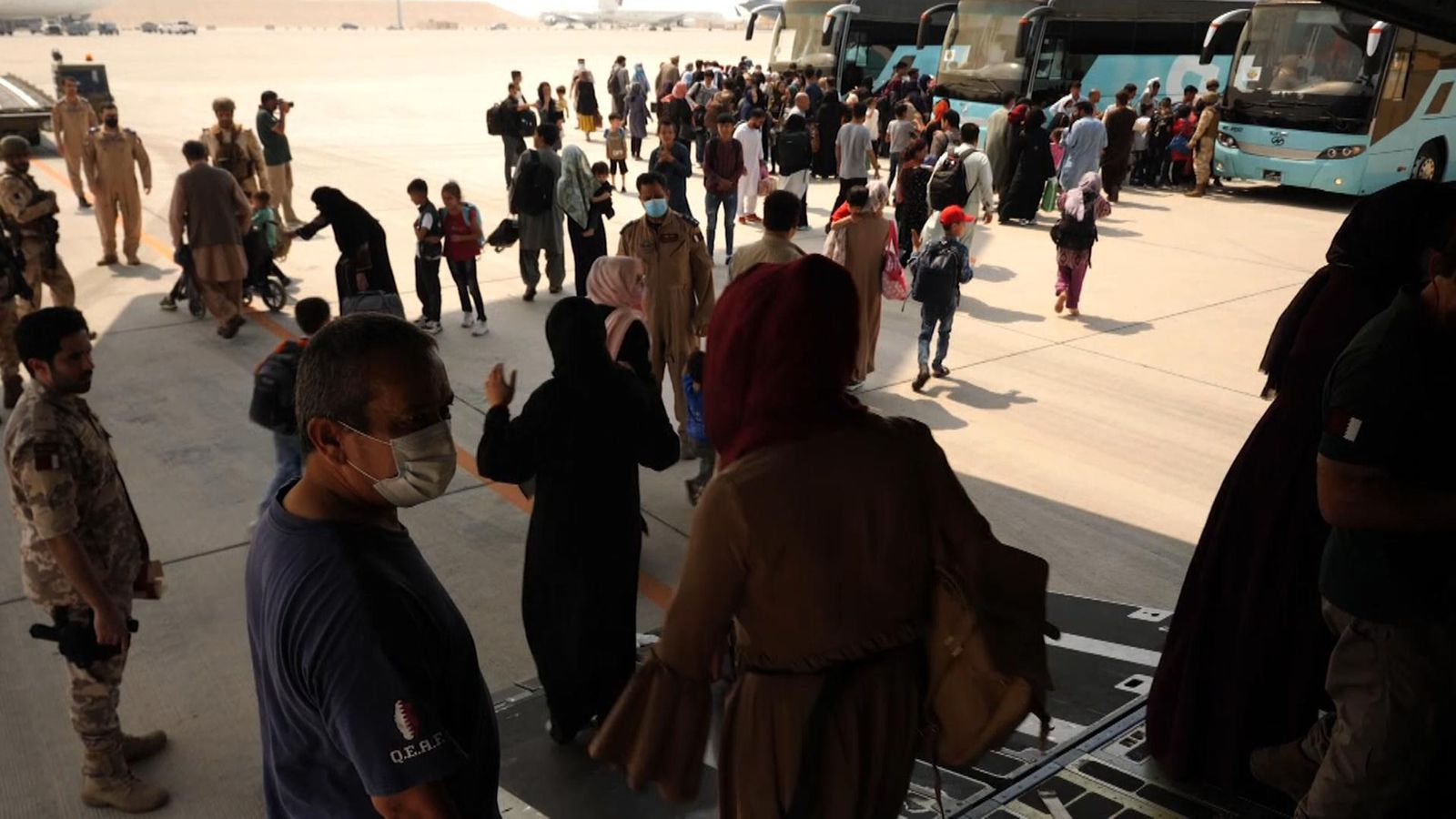On the tarmac at Al Udeid airbase in Qatar, a C17 plane opens its doors to a new life.
We’re greeted by a sea of faces – some smile with relief, others look devastated, almost all of them look tired. There are lots of children, several babies and some in wheelchairs.
It’s a three-hour flight here from Kabul but before that, we know there were days of struggle. One 16 year old stops to tell me he’s so happy to be here. It’s his first time in an aeroplane. What a maiden flight.
The Qatari aircrew carry a child down the ramp in a wheelchair. There’s such kindness amid the sadness.
The military effort is a huge humanitarian undertaking. There’s no cap on how many more flights the Qataris will send in – and when they get to Kabul it’s never clear how many people they’ll bring back. It’s simply as many as they can.
But for those still waiting for a flight out, the window for evacuation is closing fast. There are thousands at the airport hoping to leave before the deadline – and for anyone who isn’t there already, it’s probably too late. The Taliban is now stopping people travelling to the airport.
One Afghan security guard who worked for G4S protecting the British embassy in Kabul until last year has lost all hope of getting out. In a phone call from hiding, he tells me the Taliban is actively looking for him.
“They came to my father’s house and they had a room by room search and they were looking for me, for my documents but they didn’t find anything. But luckily they got nothing and they left here.” He doesn’t want to be identified and as we end the call he says he feels let down by the UK.
“They abandoned us. They’re leaving us behind,” he said.
G4S says it is working with the UK government to support a safe outcome for its employees in Afghanistan.
But for the millions who aren’t leaving – life is getting desperate.
Basic things you would expect in a functioning country aren’t happening. The banking system is on the verge of collapse, ATMs are empty, bank accounts frozen, people can’t pay their staff, and they can’t buy food.
The majority of foreign aid money is being withheld and the cost of food is going up.
The head of the World Food Programme, David Beasley, met Sky News in Doha and said this on the plight of Afghan people: “They’ll either starve or leave. If you want a repeat of Syria x 2 then ignore Afghanistan.”
World Food Programme staff are still working in the country but Mr Beasley warns they could run out of money to feed Afghanistan as soon as next month.
“You could have unprecedented famine in Afghanistan. Unprecedented. If we don’t receive the funds. If there’s not an economic recovery plan sooner than later.
“We already know out of 40 million people, 14 million of them are marching towards starvation.”
Qatar is already mediating between the Taliban and Afghan government officials about what happens next – with talks under way on who will take over running Kabul airport.
They’re also proving a critical player in the humanitarian crisis. Accommodation built for Qatar’s World Cup is now housing refugees. The person at the heart of this effort is the country’s deputy foreign minister, Lolwar Alkhater.
“We didn’t expect this number of babies, kids, pregnant women and we are trying to cope with the situation,” he said.
Follow the Daily podcast on Apple Podcasts, Google Podcasts, Spotify, Spreaker.
“Everyone was talking about a timeline that would last for weeks or months but then overnight everyone was surprised that what happened has happened and we need to deal with the situation.”
It’s clear few if any countries were prepared for what’s happening.
Airlifting tens of thousands of people to safety may be necessary but it’s not going to help Afghanistan. International efforts must now also focus on the people left behind.






















